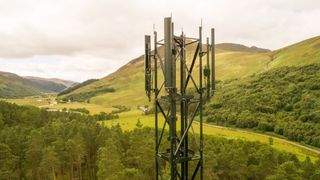Vodafone uses AI to detect and fix network issues
Machine learning will be deployed across Vodafone's European networks

Vodafone is rolling out machine learning technology that can detect and correct network problems before they impact customers across its European infrastructure.
Artificial Intelligence (AI) is increasingly vital for mobile operators looking to manage more complex network environments in the 5G era.
Operators need to be able to automatically provision services such as network slicing and dynamically allocate capacity around the network. The rollout of software-defined networking and cloud-based core infrastructure makes this possible.
- What is 5G? Everything you need to know
- These are the best business SIM-only deals around today
- And the best business broadband deals
Vodafone AI network
Vodafone’s ‘Anomaly Detection System’ is based on technology developed by Nokia Bell Labs and uses intelligent algorithms to sense when a mobile cell area is exhibiting unusual behaviour that could affect network quality.
The service is hosted on Vodafone’s cloud platform, which provides engineers with detailed analytics that will allow them engineers to fix problems such as congestion, interference, high latency, and call quality more rapidly. But the system will also be able to proactively address issues itself.
So far, Vodafone has deployed the system across 60,000 4G sites in Italy and will roll it out across Europe by early 2022 as part of a wider network transformation. The expectation is that the company will be able to automatically detect 80% of all network and capacity issues.
“We are building an automated and programmable network that can respond quickly to our customers’ needs,” said Johan Wibergh, Vodafone CTO.
Are you a pro? Subscribe to our newsletter
Sign up to the TechRadar Pro newsletter to get all the top news, opinion, features and guidance your business needs to succeed!
“As we extend 5G across Europe, it is important to match the speed and responsiveness of this new technology with a great service. With machine learning, we can ensure a consistently high-quality performance that is as smart as the technology behind it.”
“We are pleased to celebrate the first commercial deployment of our solution with Vodafone, running on the public cloud,” added Raghav Sahgal, Nokia’s President of Cloud and Network Services.
“By analyzing network data our machine-learning algorithms can detect anomalies impacting network operations and performance, helping Vodafone engineers to pre-empt and rapidly resolve issues.”
In the UK, Vodafone’s Network & Development Director Andrea Dona told TechRadar Pro earlier this year that automation was essential if it wanted to become a provider of services beyond telecoms. He said that the massive growth of data simply cannot be supported by traditional approaches to network management and capacity expansion.
- Here are the best Vodafone deals
Steve McCaskill is TechRadar Pro's resident mobile industry expert, covering all aspects of the UK and global news, from operators to service providers and everything in between. He is a former editor of Silicon UK and journalist with over a decade's experience in the technology industry, writing about technology, in particular, telecoms, mobile and sports tech, sports, video games and media.
Most Popular

